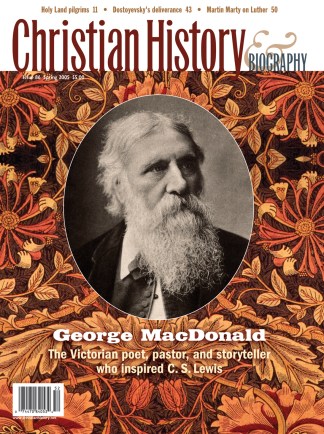No medieval Christian in Jerusalem could remember a more brutal reign than that of Caliph al-Hakim ibn Amar Allah. Convinced that Christians were up to trickery in the Church of the Holy Sepulcher (the church built over the traditional site of Jesus’ death and resurrection), al-Hakim razed it in 1008. Then his men started pillaging churches and monasteries across the Holy Land, and thousands of Christians converted to Islam out of fear of the “Mad Fatimid Caliph.”
So began a series of events that would eventually disrupt the pilgrimage routes of Christians to Jerusalem—and provoke Urban II to call for the Crusades. In time, the purpose of the pilgrim mingled with that of the knight going to liberate and defend the Holy Land (see Issue 40: The Crusades).
Yet Christian pilgrims have traveled to the Holy Land for many reasons. In the fourth century, nobles traveled there in search of the ascetic life (thereby escaping “worldly” burdens). Others later went in expectation of the Last Judgment, prophesied to take place outside the city walls of Jerusalem. Still others went as payment for their sins (a form of indulgence condemned by Martin Luther).
But some pilgrims went simply to meditate on the sacrifice of Christ at the cross, his victory over death in the grave, and his ascension to God’s right hand. Writing in 1044, Rodulf Glaber recounts the tale of one such pilgrim.
“At the same time from all over the world an innumerable crowd began to flock to the Sepulchre of the Savior in Jerusalem—in greater numbers than any one had before thought possible. Not only were there some of the common people and of the middle class, but there were also several very great kings, counts, and noblemen. Finally—and this had never happened before—many noble ladies set out with the poor people. Many desired that they might die rather than return home.
“It so happened that a man from the territory of Autun in the Burgundy area was among those who was traveling there. His name was Lethbald. When he had looked at all these holy places he at length reached the place on the Mount of Olives from which the Lord ascended into heaven in the sight of so many reliable witnesses. This is where it is promised that he will come to judge the living and the dead.
“There he threw himself down flat on the ground, spread out like a cross, and rejoiced in the Lord with unspeakable joy. Then, standing up there he raised his hands toward heaven, strained to reach it as close as he could, and gave utterance to these words, his heart’s desire. ‘Lord Jesus,’ he said, ‘who condescended for our sake to come down from the throne of thy majesty to the earth to be the Savior of mankind; who didst also from this place which mine eyes behold, robed in flesh, return to the heaven from which thou came: I pray the supreme goodness of thine almighty power that if my soul is to depart from my body this year, I may not go away from this place, but that it may happen within sight of the place of thine Ascension. For I believe that as I have followed thee in the body in order to reach this place, so my soul, unscathed and joyful, is going to follow thee into Paradise.'”
Lethbald returned with his companions to the hospice where he was staying and, after eating, retired to sleep. When his friends heard him praising God in his sleep, they tried to get him up. But he resisted, saying he was not feeling well. Eventually he called them back to his side, took the Eucharist, bade them farewell, and “gave up the ghost.”
And how is one to evaluate the pilgrimage of Lethbald? Glaber concludes: “Many return from the Jerusalem journey simply wanting to be admired, but he was truly free from that vanity.”
Copyright © 2005 by the author or Christianity Today/Christian History & Biography magazine.Click here for reprint information on Christian History & Biography.










